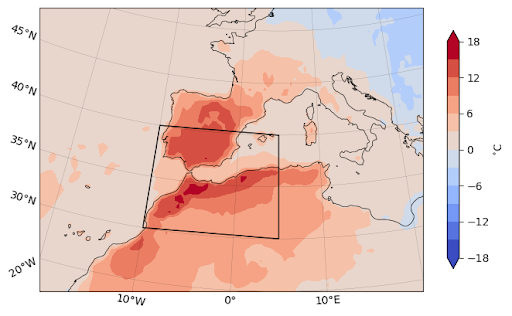A large area of southwestern Europe and northern Africa experienced extremely high temperatures usually at the end of April 2023. The record-shattering temperatures broke temperature records by a large margin, against the backdrop of an intense drought. Scientists from Morocco, France, the Netherlands, the US and the United Kingdom, collaborated to assess to what extent human-induced climate change altered the likelihood and intensity of this early season heatwave.
The heat would have been almost impossible without climate change, study finds
The rapid attribution analysis was conducted by an international team of leading climate scientists as part of the 10 researchers as part of the World Weather Attribution group. Fatima Driouech, Associate Professor at the Mohammed VI Polytechnic University and co-coordinator of MedECC contributed to the study and is quoted below. This press release was originally published by the World Weather Attribution (WWA) group.
According to the study, human-caused climate change made the record-breaking heatwave in Spain, Portugal, Morocco and Algeria (April 2023) at least 100 times more likely and the heat would have been almost impossible without climate change.
To quantify the effect of climate change on these high temperatures, scientists analysed weather data and computer model simulations to compare the climate as it is today, after about 1.2°C of global warming since the late 1800s, with the climate of the past, following peer-reviewed methods. The analysis looked at the average of the maximum temperature for three consecutive days in April across southern Spain and Portugal, most of Morocco and the northwest part of Algeria.

The researchers found that climate change made the heatwave at least 100 times more likely, with temperatures up to 3.5°C hotter than they would have been without climate change. They calculated that the event is still unusual, even with the large increase in likelihood due to human-caused warming, indicating it would have been almost impossible without climate change.
As other analyses of extreme heat in Europe have found, extreme temperatures are increasing faster in the region than climate models have predicted, a question that is currently under intense research. Until overall greenhouse gas emissions are halted, global temperatures will continue to increase and events like these will become more frequent and severe. For example, if global mean temperatures rise an additional 0.8°C, to a total warming of 2°C, models show that a heatwave such as this one would be 1ºC hotter.
While people in the Mediterranean are no strangers to high temperatures, their occurrence in April combined with the ongoing drought likely increased impacts.
Philip, S; Kew, S; Vautard, R; Pinto, I; Vahlberg, M; Singh, R; Driouech, F; Lguensat, R; Barnes, C; Otto, FEL (2023). Extreme April heat in Spain, Portugal, Morocco & Algeria almost impossible without climate change. DOI: https://doi.org/10.25561/103833
Quotes
“The intense heatwave came on top of a preexisting multi-year drought, exacerbating the lack of water in Western Mediterranean regions and threatening the 2023 crop yield. As the planet warms, these situations will become more frequent and call for long-term planning, including implementing sustainable agricultural models and effective water management policies."
Fatima Driouech, Associate Professor at the Mohammed VI Polytechnic University
“The Mediterranean is one of the most vulnerable regions to climate change in Europe. The region is already experiencing a very intense and long lasting drought and these high temperatures at a time of the year when it should be raining is worsening the situation. Without rapidly stopping the burning of fossil fuels and adaptation towards a hotter, drier climate, losses and damages in the region will continue to rise dramatically. ”
Friederike Otto, Senior Lecturer in Climate Science at the Grantham Institute for Climate Change and the Environment
"Temperature records have again been broken by a large margin, as in some other recent heatwaves around the world. The fact that temperature trends in the region are higher than what models predict shows that we need to better understand the regional effects of climate change so that we can adapt to even more extreme heat in the future."
Sjoukje Philip, Researcher at the Royal Netherlands Meteorological Institute
“Early season heatwaves tend to be deadlier as people have not yet prepared their homes or acclimated to summer temperatures. In Spain, for example, we saw heatwave adaptation measures put in place earlier than usual, which is exactly the type of adaptive heat action we need to see more of to reduce preventable deaths from heat.”
Roop Singh, Senior Climate Risk Advisor at the Red Cross Red Crescent Climate Centre
Reporting extreme weather and climate change - A guide for journalists from WWA
Extreme weather events, such as heatwaves, heavy rainfall, storms and droughts, are becoming more frequent and stronger in many parts of the world as a result of human-caused climate change. However, not all events are becoming more likely, and changes are uneven across the world. Formed in 2015, World Weather Attribution is an international collaboration that produces attribution studies on heatwaves, extreme rainfall, drought, floods, wildfires and cold spells around the world. World Weather Attribution uses weather observations and climate models to understand how climate change influences the intensity and likelihood of extreme weather events. The studies also assess the role of vulnerability and exposure in the extent of the impacts. Most studies are performed to answer the increasingly common question: ‘what was the role of climate change in this event?’ The guide ‘Reporting extreme weather and climate change’ is intended to help journalists navigate this question.
